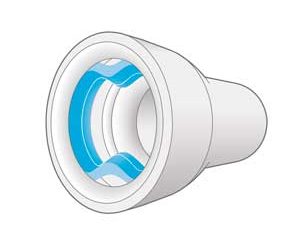Tubería de fundición dúctil
Agua Potable y Saneamiento
Las propiedades de la fundición dúctil son excepcionales y esenciales para la conducción de agua en comparación con otros materiales como la fundición gris, acero o plástico.
A diferencia de las tuberías fabricadas a partir de planchas de acero, las tuberías de fundición dúctil no presentan ninguna unión por soldadura, lo que da como resultado una tubería mucho más resistente.
Tipos de sistemas de unión para tubería de fundición de hierro dúctil

Tubería de fundición dúctil TYTON®
Conocida como junta automática flexible, fue diseñada para ser utilizada en una amplia variedad de proyectos de agua potable y aguas residuales o de alcantarillado. La tubería con junta TYTON® o equivalentes se ha convertido en un estándar internacional y representa el sistema de unión más representativo del mercado.

Tubería de fundición dúctil Acerrojada
En Construtec contamos con varios sistemas de Acerrojamiento para tubería de hierro fundido dúctil: la Junta Standard Acerrojada, con contrabrida y bulones, TYTON SIT PLUS® con insertos metálicos en la propia junta TYTON® y los sistemas de Acerrojamiento de Doble Cámara Lok&Play®.
Características y ventajas de las tubería de fundición de hierro dúctil
- Resistencia y elasticidad
La fundición dúctil es una aleación de hierro con carbono que contiene grafito libre en forma de esfera. Esta estructura molecular hace que la fundición dúctil absorba la fuerza y reaccione de forma plástica y elástica antes de llegar al punto de rotura. Es decir, la energía de impacto se convierte en deformación. - Reciclable
El hierro dúctil es un material reciclable en sí mismo. Mantiene las propiedades y la calidad inalterados y sigue un proceso de fabricación respetuoso con el medioambiente, como certifica la ISO 14001 e ISO 9001.
- Las uniones pueden ser realizadas por cualquier operario, no es necesario usar equipos de soldadura.
- Admite muy altas presiones.
- Montaje sencillo, incluso en zonas complejas.
- Todo queda revestido, no se precisan operaciones de revestimiento in-situ.
- No precisa mantenimiento.
Multimedia
Vídeos técnicos e instalaciones con tubería de fundición de hierro dúctil TYTON®
Tutorial de instalación en puente
Instalación de Tubería en flotación
Instalación de Tubería Agua potable


